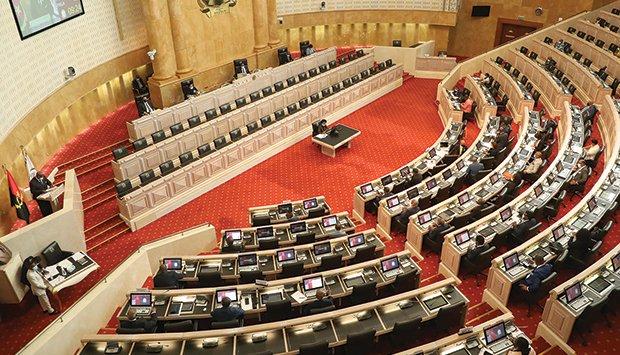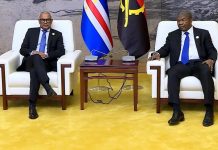Africa-Press – Angola. Despite all the controversy and skepticism of some deputies around the introduction into the Angolan legal system of the figure of itinerant judge, it ended on Wednesday (04), in Luanda, for being approved in the specialty and unanimously, by the National Assembly.
Discussions began on Monday and continued until yesterday between members of the First Commission and members of the Justice and Law Reform Commission, who concluded in the urgent need for such a figure to be approved, albeit provisionally, within the framework of the procedural acceleration in the courts and districts in the country, and within the scope of the ongoing reforms in the justice sector.
MPLA deputy João Pinto, vice-president of the Committee on Constitutional and Legal Affairs of the National Assembly, was among those who most intervened in the meeting to discourage the creation of the figure of itinerant judge with jurisdiction in any part of the territory or district. He justified that the measure may jeopardize the independence of the judge, but stated that it is sensible to admit this figure on a transitional basis.
Also MPLA parliamentarian António Paulo was not satisfied, above all, with the lack of methodology in the discussions, stating that “passing cases from one to the other” should not imply the territorial displacement of the judge. He said that trying to extend this logic to other courts or jurisdictions will not work, noting that the territorial location of judges in the Court of Appeal and in the District is completely different.
During the discussions, he also warned of the consequences and risks of the institution of the figure of national itinerant judge, as advocated by the new wording of the proposal. “We are not calling into question the goodness of the proposal, but the risk to the judicial system,” he said.
The chairman of the First Committee on Constitutional and Legal Affairs, Reis Júnior, requested the “proper framing” of the figure of itinerant judge, so that, from a technical point of view, it does not harm the legal order. He recalled that the figure of the itinerant judge appears to defend values: “We chose, perhaps, to violate some principles, but to privilege justice”.
Despite advising parliamentarians to take the risks related to the introduction of the figure of itinerant judge into the Angolan legal system, Reis Júnior expressed “some reservations” as to the effectiveness of the measure. “At some point, we will block, because the number of judges in the country remains the same,” he said.
Another deputy who was no less interventionist in the session was Virgílio Tyova, from the MPLA, who also criticized the less methodological form of the discussions and did not assume the concept of an itinerant judge.
Jurist Raúl Araújo, from the Justice and Law Reform Commission, said that the concept is linked to a situation of abnormality that the country is experiencing and assured that, with the emergence of itinerant judges, a different category of this class will not be created.
“Itinerant judges are normal judges, they will perform their duties in the courts and may, by decision of the Superior Council for the Judiciary, move from one side to the other, according to exceptional situations”, he explained, defending greater power for the body. , in order to determine the locations to which they should be placed.
He explained that at the level of the Supreme Court, only counselor judges can compete as itinerant judges, only judges of the Court of Appeal can compete, while for District Courts, the candidacy of judges of law is admitted. He recalled that the principle of irremovability does not replace that of transfer. “The fact that the judge is stationed in a province does not mean that he has to stay in the same locality all his life”, he concluded.
Action At The National Level
The Secretary of State for Justice stressed that the underlying philosophy of the concept of itinerant judge is the fact that this figure acts at the national level and is not limited to a District, province or judicial region. “He IS a kind of traveling salesman, that is, an individual who walks around the country to resolve pending legal proceedings”, he said.
Orlando Fernandes said that if the itinerant judge were assigned to a district to resolve pending issues in another section of the same institution, as is currently the case, much of the reform projected in the Justice sector would be lost.
The Secretary of State spoke of the need to train and recruit new judges, as there are currently around 700 judges in the country for an estimated population of just over 30 million.
For More News And Analysis About Angola Follow Africa-Press






